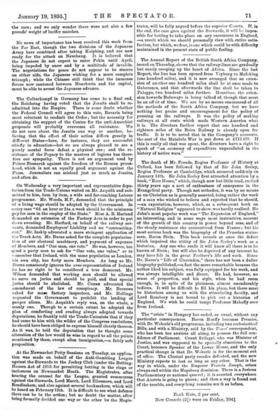The death of Mr. Fronde, Regius Professor of History at
Oxford, has been followed by that of Sir John Seeley, Regius Professor at Cambridge, which occurred suddenly on January 14th. Sir John Seeley first attracted attention by a book, "Ecce Homo," which, though now but little read, excited thirty years ago a sort of enthusiasm of annoyance in the Evangelical party. Though not orthodox, it was by no means so an-Christian as is generally asserted, being rather the work of a man who wished to believe and expected that he should, —an expectation, however, which, as a subsequent book on "Natural Religion" appeared to show, was hardly realised. Sir John's most popular work was "The Expansion of England," an interesting, and in some ways most instructive, account of the growth of this country in power beyond seas, and of the steady resistance she encountered from France ; but his most serious book was the biography of the Prussian states- man, Baron Stein. This book reveals at once the defect which impaired the utility of Sir John Seeley's work as a historian. Any one who reads it will know all there is to be known of Stein ; but will also be deprived of any interest he may have felt in the great Freiherr's life and work. Since Dr. Nares's "Life of Clarendon," there has not been a duller biography published,—a fact the more remarkable because the author liked his subject, was fully equipped for his work, and was always intelligible and direct. He had, however, no sense of proportion, and his style, when he had room enough, is, in spite of its plainness, almost unendurably tedious. It will be diffieult to fill his place, but there must be historians among us with the stimulating faculty, and Lord Rosebery is not bound to pick out a historian of England. We wish he could tempt Professor lfahaffy over from Ireland.


































 Previous page
Previous page